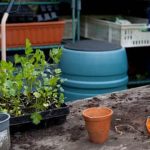Are you wondering what to deter raccoons from vegetable gardens? Raccoons can be a nuisance when it comes to keeping your vegetable garden well-maintained and free of unwanted visitors. In this article, we will explore the various methods and techniques to effectively deter raccoons from wreaking havoc in your garden.
Raccoons are known for their curiosity, nimbleness, and voracious appetites, making them a common pest in vegetable gardens. Understanding their behavior and habits is key to finding the most effective ways to keep them at bay. From identifying signs of their presence to implementing natural deterrents and physical barriers, we will cover all you need to know in order to protect your crops from these pesky animals.
Many gardeners struggle with finding effective solutions to the raccoon problem in their vegetable gardens. We will delve into common methods that do not work in deterring raccoons, as well as explore the natural deterrents that have proven successful in keeping them away from your cherished produce. Additionally, we will discuss the importance of proper garden maintenance as a crucial aspect of deterring raccoons and other pests from invading your space.
Identifying the Signs of Raccoon Presence in Your Garden
When it comes to protecting your vegetable garden from raccoons, the first step is to be able to identify the signs of their presence. Raccoons are nocturnal creatures, so the evidence of their activity can often be found in the early morning.
One of the most telling signs of raccoon presence is damage to your crops. Raccoons are known for raiding gardens in search of food, so if you notice fruits and vegetables with bite marks or completely missing, it could be a sign that raccoons are visiting your garden.
Another indicator of raccoon activity is overturned soil or disturbed mulch. Raccoons have a habit of digging in soil in search of grubs and other insects, so if you notice areas where the soil has been turned over or mulch has been scattered, it may be a sign that raccoons have been foraging in your garden. Additionally, raccoons also leave behind distinct paw prints that can be identified as a sign of their presence.
Scavenged Garbage
In addition to damage to your garden, raccoons are known for scavenging through garbage cans and bins. If you notice trash strewn across your yard or torn open garbage bags, this could indicate that raccoons are frequenting your property. It’s important to be vigilant in identifying these signs early on so that you can take action to deter raccoons from further damaging your vegetable garden.
Noises and Sightings
Finally, paying attention to any unusual noises at night around your property or catching sight of raccoons near your garden can also serve as clear indications of their presence. Raccoons are vocal animals and may emit chattering sounds or growls. Keeping an eye out for any visual sightings of these creatures will help you confirm their presence in your garden.
Common Methods That Do Not Work in Deterring Raccoons
Raccoons can be a pesky nuisance in vegetable gardens, causing damage to crops and creating a mess. Many gardeners may try various methods to deter raccoons from their gardens, but not all of them are effective. It’s important to understand the common methods that do not work in deterring raccoons in order to focus on more effective solutions.
Ultrasonic Devices
Some gardeners may turn to ultrasonic devices that emit high-frequency sounds to deter raccoons. However, these devices have been found to be largely ineffective in keeping raccoons away from vegetable gardens. Raccoons can quickly become accustomed to the sound and simply ignore it, making this method unreliable.
Mothballs and Ammonia-Soaked Rags
Another common method that is believed to deter raccoons is the use of mothballs or ammonia-soaked rags placed around the garden. While these items may produce strong odors that could potentially repel raccoons, they are not a reliable deterrent. Some studies have shown that raccoons may actually be attracted to the smell rather than being repelled by it.
Bright Lights and Noise Machines
Using bright lights or noise machines as a means of scaring off raccoons is also a method that often fails. Raccoons are adaptable creatures and can quickly become desensitized to continuous noises or bright lights, rendering this method ineffective in the long term.
It’s important for gardeners to recognize the limitations of these common methods when it comes to deterring raccoons from vegetable gardens. By understanding what doesn’t work, gardeners can focus their efforts on implementing more effective solutions for keeping raccoons at bay.
Natural Deterrents to Keep Raccoons Away From Your Vegetable Garden
There are several natural methods to help keep raccoons away from your vegetable garden. These options are effective and environmentally friendly, making them a popular choice for many gardeners. Here are some natural deterrents to consider:
1. Planting repellent plants: Certain plants emit odors that raccoons find unpleasant, and they will avoid areas where these plants are present. Consider incorporating plants like marigolds, daffodils, or alliums into your garden to naturally repel raccoons.
2. Using predator urine: Raccoons are known to be deterred by the scent of predators such as foxes and coyotes. You can purchase predator urine from gardening stores and strategically place it around your garden to create the illusion of a threat.
3. Spice deterrents: Raccoons have a strong sense of smell and certain spices can act as a natural deterrent. Sprinkling cayenne pepper or chili powder around your garden can help keep raccoons at bay.
By incorporating these natural deterrents into your gardening routine, you can effectively deter raccoons from feasting on your hard-earned vegetables without resorting to harmful chemicals or inhumane methods. Remember that consistency is key when using natural deterrents, so be sure to reapply as needed throughout the growing season for best results.
Physical Barriers to Prevent Raccoon Access to Your Crops
To prevent raccoons from accessing your precious vegetable garden, physical barriers can be an effective deterrent. One of the most common methods is installing a sturdy fence around your garden. Raccoons are excellent climbers and can easily scale typical chain-link or wooden fences. To deter them, consider adding an electric wire at the top angled outward to prevent them from climbing over.
Another effective physical barrier to keep raccoons out of your crops is a motion-activated sprinkler system. When they approach the garden, the sudden burst of water will startle and deter them, preventing any potential damage to your vegetables.
Lastly, covering your crops with mesh or netting can also effectively keep raccoons at bay. Make sure the mesh is securely fastened to the ground to prevent raccoons from digging underneath it and accessing your garden. This method has the added benefit of protecting your plants from other pests like birds as well.
| Physical Barrier | Effectiveness |
|---|---|
| Fence with electric wire | Highly effective if properly installed |
| Motion-activated sprinkler system | Effective in deterring raccoons without harming them |
| Mesh or netting cover | Effective against raccoons and other garden pests |
Repellents
One popular approach that does not work in repelling raccoons is ammonia-soaked rags or balls. While the smell of ammonia may initially deter raccoons, it ultimately does not provide a long-term solution. Additionally, mothballs, another commonly suggested repellent, are ineffective and can be harmful if ingested by wildlife or pets.
On the other hand, there are natural and commercially available repellents that have been proven to be effective in keeping raccoons away from vegetable gardens. For example, certain predator urine sprays can mimic the presence of a larger animal in the area, causing raccoons to stay clear of the garden.
Similarly, using hot pepper sprays or garlic-based solutions can create an unpleasant environment for raccoons without causing them harm. These types of repellents can be strategically applied around the perimeter of the garden to effectively deter raccoons.
It is important for gardeners to carefully research and select appropriate repellents based on their specific needs and concerns. By understanding what works and what doesn’t in keeping raccoons at bay, individuals can implement effective measures to protect their vegetable gardens from these pesky pests.
Understanding the Importance of Proper Garden Maintenance in Deterring Raccoons
Raccoons can be a persistent problem in vegetable gardens, often causing damage to crops and creating a mess. While there are various methods to deter them from your garden, it is important to understand the role of proper garden maintenance in preventing raccoons from being attracted to your property. Ensuring that your garden is well-maintained can significantly reduce the chances of raccoons setting up shop in your vegetable patch.
One crucial aspect of garden maintenance for deterring raccoons is the proper disposal of food waste. Raccoons are attracted to areas where they can find easily accessible food sources, so it is essential to keep your garden free from any leftover fruits, vegetables, or seeds that may attract these animals. Additionally, ensuring that garbage cans are tightly sealed and not left out in the open can also help prevent raccoons from being drawn to your property.
Furthermore, maintaining a clean and organized garden can also deter raccoons from taking up residence in your vegetable patch. Keeping vegetation trimmed and removing any overgrown plants or debris can eliminate potential hiding spots for raccoons. By minimizing the available shelter and hiding places, you can make your garden less appealing to these animals.
| Method | Effectiveness |
|---|---|
| Proper disposal of food waste | Highly effective |
| Tightly sealed garbage cans | Highly effective |
| Maintaining a clean and organized garden | Highly effective |
Conclusion
In conclusion, deterring raccoons from vegetable gardens requires a multi-faceted approach that includes both natural and physical deterrents. While identifying the signs of raccoon presence in your garden is important, it is equally crucial to understand that common methods such as using loud noises or lights may not work effectively in keeping raccoons at bay. Instead, implementing natural deterrents such as predator urine or hot pepper spray can help repel these pests without causing harm to them.
Additionally, physical barriers such as fences or electric wires can be effective in preventing raccoons from accessing your crops. However, it is important to ensure that these barriers are properly installed and maintained to remain effective over time. In addition to these methods, using repellents such as ammonia-soaked rags or commercial products specifically designed for deterring raccoons can also contribute to keeping your vegetable garden free from unwanted visitors.
Ultimately, proper garden maintenance plays a significant role in deterring raccoons. Keeping your garden clean and free of food sources, regularly harvesting ripe vegetables, and removing any potential shelter for raccoons can help reduce the attractiveness of your garden to these pests. By combining these effective methods and staying vigilant in maintaining your garden, you can successfully deter raccoons and protect your vegetable crops.
Frequently Asked Questions
How Do Farmers Keep Racoons Away?
Farmers use various methods to keep raccoons away from their crops, such as installing electric fencing, using motion-activated sprinklers, or even deploying guard dogs to scare off the nocturnal pests. By implementing these deterrents, farmers can protect their livelihood and prevent raccoons from causing damage to their crops.
What Deters Raccoons From Your Garden?
There are several things that can deter raccoons from invading your garden. One effective method is to use strong-smelling repellents, such as ammonia-soaked rags or commercial repellent sprays. Additionally, securing garbage cans with tight-fitting lids and eliminating potential food sources can also help discourage raccoons from establishing a presence in your garden.
What Smells Do Raccoons Hate?
Raccoons have a strong sense of smell, so there are certain odors that they dislike. These include ammonia, vinegar, and hot pepper. By strategically placing items with these scents around your property or garden, you can create an environment that raccoons find unpleasant and are less likely to frequent.

If you’re looking to get into vegetable gardening, or are just looking for some tips on how to make your current garden better, then you’ve come to the right place! My name is Ethel and I have been gardening for years. In this blog, I’m going to share with you some of my best tips on how to create a successful vegetable garden.





